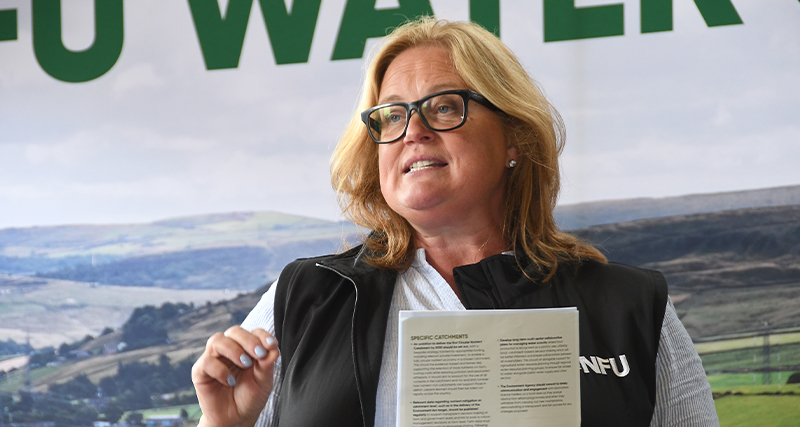NFU sounds alarm on water crisis threatening UK food security

British farming faces a growing water crisis — and the NFU has launched an urgent national summit to tackle the deepening threats to food production, water quality, and supply.
The event provided a crucial platform to explore the pressing challenges facing UK agriculture — from water pollution and climate change to ageing infrastructure and extreme weather patterns — all of which threaten national food security.
Held at Beeston Hall Farms in West Yorkshire on 28 July, the summit drew more than 60 delegates including Defra Secretary Steve Reed, alongside representatives from water companies, NGOs, the supply chain, and industry experts.
Speaking from her own farm, NFU Vice-President Rachel Hallos emphasised the growing seriousness of the situation: “Water is our most precious resource. It’s absolutely vital to producing the food our country needs.
“But we’re facing increasing pressures on water be it resources, flooding, or quality." She highlighted how essential farming practices—such as the use of nutrients—can inadvertently affect river water quality through runoff, and how the ongoing cycle of droughts and floods is damaging crop yields.
"It all undermines the stability and resilience of our farming businesses and ultimately impacts our food security.”
She pointed to new NFU survey results showing that nearly two-thirds of its members have experienced a severe weather event in the past decade that has affected their farm business.
Calling for “open and honest conversations” and action across the board, Ms Hallos said: “Now’s the time to start having open and honest conversations and treating water as a national strategic priority.
"But we cannot do it alone. We need everyone to start thinking about what we can each individually and collectively do and what will make a real difference.”
Breakout sessions at the summit focused on investment, innovation and the circular economy, with attendees repeatedly highlighting the urgent need for greater investment in water infrastructure.
This includes improved access to accurate data, modernised planning frameworks, and infrastructure support for slurry storage and on-farm reservoirs.
Encouragingly, the Secretary of State expressed a willingness to explore further measures within the updated Sustainable Farming Incentive (SFI) that could support efforts to reduce water pollution.
Ms Hallos emphasised that the summit marks only the beginning of what must be an ongoing, collaborative effort: "This week’s summit was just the start," she added.
"These conversations must continue so we have a joined-up approach that allows us to collaborate better with government, local authorities, environmental NGOs, the supply chain and water companies, and ensures farmers have access to a clean supply of water to produce sustainable food for the nation and prioritises UK food security as national security.”








